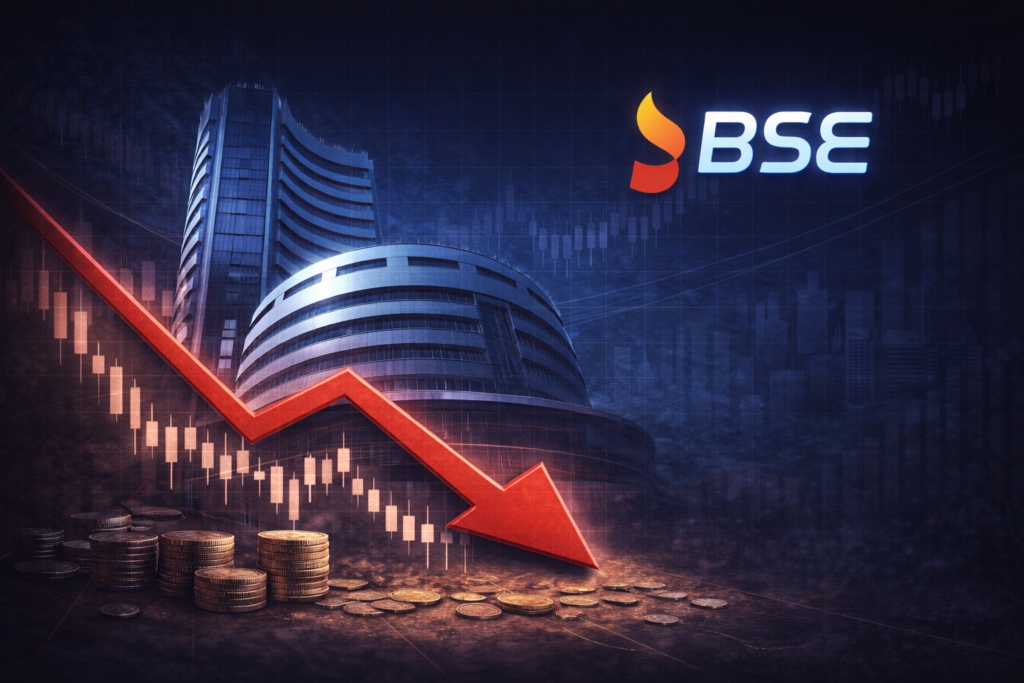Investing in large-cap stocks is preferred for stability and consistent returns. With a market capitalisation of over ₹20,000 crore, these companies have a proven track record, strong financials, and the ability to withstand market fluctuations. They often lead their industries, making them a reliable choice for long-term wealth creation and short-term gains.
Quick Summary
These are some of the best large-cap stocks in India for investment in 2026:
Reliance Industries – A diversified behemoth with business interests in energy, telecom, and retail
Tata Consultancy Services (TCS) – India’s largest IT services provider with international customers
Infosys – Pioneer in digital transformation and software consulting
HDFC Bank – Top private bank with steady growth and sound fundamentals
ICICI Bank – Penetrating via Retail and Digital banking space, +:+ networking sites and messaging platforms.
Larsen & Toubro (L&T) – Engineering, construction, infrastructure heavyweight
Hindustan Unilever (HUL) – FMCG leader in the country with strong brands and market leadership
Why It Matters: Someone could do very well in investing in large-cap stocks, which tend to be more established companies with proven business models and predictable returns. These businesses are well-positioned to benefit from India’s long-term economic growth, making them ideal candidates for core holdings in your portfolio.
Top Large-Cap Stocks In 2026
| Stock Name (₹) | Market Cap (₹) | P/E Ratio | EPS (₹) | 52 Week High (₹) | 52 Week Low (₹) |
|---|---|---|---|---|---|
| Reliance Industries Ltd | 19,342,487,255,000 | 23 | 61 | 1,612 | 1,115 |
| Tata Consultancy Services Ltd | 9,559,348,016,028 | 20 | 132 | 3,984 | 2,585 |
| HDFC Bank Ltd | 14,223,906,667,816 | 19 | 48 | 1,021 | 831 |
| Bharti Airtel Ltd | 12,100,383,365,390 | 40 | 51 | 2,175 | 1,560 |
| ICICI Bank Ltd | 10,166,310,500,000 | 19 | 73 | 1,500 | 1,200 |
| Infosys Ltd | 5,439,590,666,958 | 19 | 67 | 1,874 | 1,282 |
| State Bank of India | 11,000,128,211,586 | 13 | 92 | 1,204 | 680 |
| Hindustan Unilever Ltd | 5,542,215,365,526 | 51 | 46 | 2,750 | 2,136 |
| ITC Ltd | 3,964,245,131,527 | 11 | 28 | 444 | 302 |
| Life Insurance Corporation of India | 5,495,474,357,881 | 10 | 84 | 980 | 715 |
Large-cap stocks can prvide stability, consistent returns, and long-term wealth creation. These companies have strong financials, well-established market positions, and a history of steady growth. Based on key selection criteria such as revenue growth, financial health, and market leadership, here are some of the best large-cap stocks in India worth considering.
Understanding Large Cap Stocks
Large-cap stocks belong to companies with a market capitalisation (total value of all their shares) of over ₹20,000 crore. These companies are well-established, financially strong, and have a proven track record in the market. They are leaders in their respective industries, operating across banking, IT, FMCG (fast-moving consumer goods), healthcare, and more.
Large-cap stocks are listed on major stock exchanges, such as the National Stock Exchange (NSE) and Bombay Stock Exchange (BSE), and are often included in benchmark indices like the Nifty 50 and Sensex. Due to their stability and growth potential, these stocks usually attract institutional investors, including mutual funds and foreign investors.
Benefits of Investing in Large Cap Stocks
Large-cap stocks offer several advantages, making them a preferred choice for both new and experienced investors:
- Stability in Volatile Markets: These companies have strong balance sheets and consistent earnings, allowing them to withstand economic fluctuations better than smaller companies.
- Regular Dividend Payments: Many large-cap companies distribute dividends (profits shared with shareholders), providing a steady income source alongside stock appreciation.
- Lower Risk Compared to Mid and Small Caps: While all stocks carry risk, large-cap stocks are less prone to sudden price drops due to their established market position.
- Liquidity (Ease of Buying and Selling): These stocks have high trading volumes, meaning you can buy or sell them easily without major price fluctuations.
- Strong Regulatory Compliance: Large companies follow strict governance and disclosure norms, reducing the chances of fraud or mismanagement.
Large Cap Stocks vs. Mid Cap and Small Cap Stocks
Here’s an overview of the key differences between large-cap, mid-cap, and small-cap stocks, which will help you build a balanced investment portfolio.
| Feature | Large Cap Stocks | Mid-Cap Stocks | Small Cap Stocks |
| Market Capitalisation | ₹20,000 crore and above | ₹5,000 crore to ₹20,000 crore | Below ₹5,000 crore |
| Risk Level | Low | Moderate | High |
| Growth Potential | Steady | Faster than large caps | Highest but unpredictable |
| Liquidity | High | Moderate | Low |
| Dividend Payouts | Regular | Occasional | Rare |
| Volatility (Price Fluctuations) | Low | Moderate | High |
Best Large Cap Stocks to Buy in India
When choosing the best large-cap stocks to invest in, it’s essential to analyse key financial and market factors. Here are the criteria we used to shortlist the best large-cap stocks to buy in India:
- Consistent Revenue and Profit Growth: Companies with a strong track record of revenue and profit growth over the past 5–10 years are more likely to sustain long-term performance.
- Strong Financial Ratios: Metrics like P/E ratio, ROE (Return on Equity), and Debt-to-Equity ratio help assess valuation, profitability, and financial stability.
- Market Leadership: Established companies with a dominant position in their industry tend to be more resilient to economic downturns.
- Dividend Payouts: Stocks with a history of regular and increasing dividends indicate financial strength and a commitment to shareholder returns.
- Economic and Sector Trends: Industries with strong growth potential and favourable government policies offer better long-term investment opportunities.
- Institutional Investor Confidence: Higher investments from FIIs (Foreign Institutional Investors) and DIIs (Domestic Institutional Investors) signal strong market trust in the company.
Using these criteria, we have identified some of the best large-cap stocks in India that offer stability and growth potential for investors. These include:
1. Reliance Industries Ltd (RIL)
Reliance Industries is India’s largest conglomerate with diversified businesses across petrochemicals, retail, telecom, and digital services. It has a strong market presence and continues to expand into new sectors like renewable energy. The company has significantly reduced debt and is consistently innovating, making it a strong choice for long-term investors.
- Sector: Conglomerate (Energy, Retail, Telecommunications)
- Market Cap: ₹16,85,249 Cr.
2. Tata Consultancy Services Ltd (TCS)
TCS is a leading IT services provider known for its stable revenue growth, strong return on equity (ROE), and consistent dividend payouts. With a well-diversified global client base and a focus on digital transformation, TCS remains a preferred stock for investors looking for stability and growth in the tech sector.
- Sector: Information Technology (IT Services)
- Market Cap: ₹14,72,802 Cr.
3. HDFC Bank Ltd
HDFC Bank is India’s largest private-sector bank, known for its strong balance sheet and high profitability. It has consistently delivered robust earnings growth and maintained a healthy dividend payout. The bank continues to expand its presence across retail and corporate banking, making it a solid investment choice.
- Sector: Banking & Financial Services
- Market Cap: ₹12,84,654 Cr.
4. Bharti Airtel Ltd
Bharti Airtel is one of India’s top telecom operators and has a strong presence in India and Africa. It has shown steady revenue growth, driven by increasing data consumption and strategic investments in 5G infrastructure. The company also maintains a healthy dividend payout, making it attractive for investors.
- Sector: Telecommunications
- Market Cap: ₹9,89,046 Cr.
5. ICICI Bank Ltd
ICICI Bank is one of India’s leading private banks, offering various financial services. It has demonstrated strong profit growth over the years and continues to expand its digital banking services. With a stable financial position and a well-diversified portfolio, ICICI Bank is a strong contender for long-term investment.
- Sector: Banking & Financial Services
- Market Cap: ₹8,85,224 Cr.
6. Infosys Ltd
Infosys is India’s second-largest IT services company, known for its strong return on equity and consistent dividend payouts. It focuses on cloud computing, artificial intelligence, and automation, making it well-positioned for future growth. The company’s low debt and stable earnings make it a preferred stock for IT investors.
- Sector: Information Technology (IT Services)
- Market Cap: ₹7,73,819 Cr.
7. State Bank of India (SBI)
SBI is India’s largest public-sector bank with a dominant retail and corporate banking position. It has consistently delivered strong earnings growth and maintained a solid balance sheet. The bank’s expansion in digital services and improved asset quality make it an attractive option for investors.
- Sector: Banking & Financial Services
- Market Cap: ₹6,78,988 Cr.
8. Hindustan Unilever Ltd (HUL)
HUL is a market leader in the FMCG sector with a strong portfolio of well-known brands. The company has a steady revenue and profit growth history, backed by strong consumer demand. Its ability to maintain high dividend payouts and low debt levels makes it a reliable stock for long-term investors.
- Sector: Fast-Moving Consumer Goods (FMCG)
- Market Cap: ₹5,73,049 Cr.
9. ITC Ltd
ITC operates in multiple sectors, including FMCG, hospitality, and agriculture. The company has maintained strong profitability, offers a good dividend yield, and has low debt levels. Its expansion in the non-tobacco FMCG segment and increasing hotel business make it a well-balanced investment option.
- Sector: Diversified (FMCG, Hotels, Paper, Agri-Business)
- Market Cap: ₹5,68,156 Cr.
10. Life Insurance Corporation of India (LIC)
LIC is India’s largest life insurance company with a dominant market share. It continues to grow its insurance business while expanding into investment and financial services. With strong revenue generation and steady profit growth, LIC remains a key player in the financial sector.
- Sector: Insurance & Financial Services
- Market Cap: ₹5,24,120 Cr.
Factors to Consider Before Investing in Large Cap Stocks
Investing in large-cap stocks requires more than just selecting well-known companies. You should evaluate key financial and market factors to make informed decisions and maximise returns. Here’s what you need to consider:
- Macroeconomic Conditions: Interest rates, inflation, and GDP growth impact stock performance. A growing economy usually benefits large-cap stocks.
- Sector Performance: Different industries perform differently based on economic cycles. Sectors like IT and FMCG tend to be resilient, while banking and energy stocks may be more sensitive to policy changes.
- Global Market Trends: Large-cap stocks often have international exposure. Monitoring global trade policies, currency fluctuations, and geopolitical events can help inform decisions.
- Investor Sentiment: Large-cap stocks attract institutional investors. Keeping track of FIIs (Foreign Institutional Investors) and DIIs (Domestic Institutional Investors) activities can provide insights into market trends.
Financial Health and Performance Metrics
Apart from the above factors, assessing a company’s financial stability and long-term profitability is important. A few key indicators that can help you determine whether a stock is worth investing in are:
- Revenue and Profit Growth: Consistent earnings growth is a sign of a strong company. Look at the past 5–10 years of financial statements to gauge stability.
- P/E Ratio (Price-to-Earnings Ratio): A lower P/E ratio than industry peers may indicate a stock is undervalued. However, a high P/E ratio could mean high growth potential.
- Debt-to-Equity Ratio: A lower ratio means a company is not overly reliant on debt, reducing financial risk.
- Return on Equity (ROE) and Return on Assets (ROA) indicate how efficiently a company generates profits from its equity and assets. Higher numbers suggest better performance.
- Dividend History: Companies with a stable dividend payout history often indicate strong financial health and investor confidence.
Investing in US Stocks Through Appreciate
Diversifying your investments can help reduce risk and improve returns. With platforms like Appreciate, you can also invest in US stocks, giving you access to global markets. Appreciate allows you to:
- Analyse Global Stocks: Compare financial metrics, check valuations, and track industry performance.
- Monitor Market Trends: Get real-time updates on stock movements, earnings reports, and economic indicators.
- Expand Your Portfolio: Invest in leading US companies like Apple, Microsoft, Tesla, and Amazon to balance your portfolio with global exposure.
How to Invest in Large Cap Stocks?
Investing in large-cap stocks is straightforward, but making informed decisions is key to maximising returns. Here’s how you can get started:
- Open a Demat and Trading Account: You need a Demat account (to hold shares) and a trading account (to buy and sell shares) with a registered stockbroker.
- Choose a Stock Market Exchange: Large-cap stocks are listed on the NSE (National Stock Exchange) and BSE (Bombay Stock Exchange). You can trade on either platform.
- Research and Select Stocks: Analyse financial reports, historical performance, industry trends, and future growth prospects before investing. You can also track stocks using indices like Nifty 50 and Sensex.
- Decide Your Investment Amount: Allocate funds based on risk tolerance and investment goals. Consider investing in multiple large-cap stocks to diversify your portfolio.
- Place Your Order: Use your stockbroker’s platform to place a market order (an instant buy/sell) or a limit order (a buy/sell at a specific price).
- Monitor and Review Your Portfolio: Track stock performance regularly and adjust based on market conditions and company performance.
Tips for Beginners Investing in Large Cap Stocks
Following a few smart strategies can help you make informed investment decisions if you’re just starting. Here are some key tips:
- Start with Blue-Chip Stocks: Blue-chip stocks (established companies with a strong financial history) are less volatile and ideal for beginners. Some examples include Reliance Industries, TCS, HDFC Bank, and Infosys.
- Invest for the Long Term: Large-cap stocks grow steadily over time. Holding them for a few years can yield better returns.
- Diversify Your Portfolio: Don’t invest all your money in one stock to reduce risk. Spread your investments across different sectors.
- Use SIP (Systematic Investment Plan) in Stocks: Some platforms allow you to invest in stocks through SIP, which involves buying small quantities regularly instead of a lump sum.
- Keep an Eye on Market Trends: Follow market news, economic policies, and quarterly earnings reports.
Common Mistakes to Avoid When Buying Large Cap Stocks
Many investors make avoidable mistakes that can impact their returns. Here’s what you should watch out for:
- Investing Without Research: Buying stocks based on trends or tips without analysing their financials can lead to losses.
- Ignoring Market Timing: While large-cap stocks are stable, buying at peak prices can reduce short-term gains. Before investing, check valuation metrics like the P/E ratio (price-to-earnings ratio).
- Putting All Money in One Stock: Even the best large-cap stocks can face downturns. Diversification is key to minimising risk.
- Not Reviewing Your Portfolio: Holding onto underperforming stocks for too long can impact returns. Regularly assess your portfolio and rebalance when necessary.
- Letting Emotions Drive Decisions: Avoid panic selling during market dips or buying in a rush during market highs. Stay patient and follow a strategy.
The Bottom Line
Large-cap stocks are fundamental to a stable investment strategy, offering long-term value with minimal risk. Their financial strength, consistent earnings, and ability to thrive in different market conditions make them a preferred choice for many investors.
While short-term fluctuations may occur, their long-term potential remains strong. By focusing on quality companies with solid financials, you can build a resilient portfolio that withstands market uncertainties while delivering consistent returns.
Frequently Asked Questions (FAQs)
What are the best large-cap stocks in India right now?
Some of the best large-cap stocks in India include Reliance Industries, Tata Consultancy Services (TCS), HDFC Bank, Bharti Airtel, ICICI Bank, Infosys, State Bank of India (SBI), Hindustan Unilever (HUL), ITC, and Life Insurance Corporation of India (LIC). These companies have strong financials, stable growth, and market leadership in their respective industries.
How do large-cap stocks differ from mid-cap and small-cap stocks?
Some ways large-cap stocks differ from mid-cap and small-cap stocks are:
- Large-cap stocks are well-established companies with a market capitalisation above ₹50,000 Cr, which is known for stability and steady returns.
- Mid-cap stocks have a market cap between ₹10,000 Cr. and ₹50,000 Cr., offering higher growth potential but with slightly more risk.
- Small-cap stocks, with a market cap below ₹10,000 Cr., are known for aggressive growth and higher volatility and risk.
Are large-cap stocks a safe investment for long-term growth?
Large-cap stocks are generally considered safer investments due to their strong market position, consistent revenue streams, and resilience during economic downturns. They may not offer the highest short-term gains, but they provide steady returns and lower volatility over the long term.
What factors should I consider before investing in large-cap stocks?
Some factors to consider before investing in large-cap stocks are:
- Financial performance: Check revenue growth, profit margins, and return on equity (ROE).
- Debt levels: Lower debt usually indicates financial stability.
- Industry outlook: Consider growth potential in the sector.
- Dividend payouts: Regular dividends indicate a financially healthy company.
- Market trends: Assess overall market conditions and stock performance.
Where can I find a reliable list of top large-cap stocks in India?
You can find updated lists of top large-cap stocks on stock market websites like NSE India, BSE India, Moneycontrol, and Economic Times and through investment platforms that provide real-time stock data and insights.
Disclaimer: Investments in securities markets are subject to market risks. Read all the related documents carefully before investing. The securities quoted are exemplary and are not recommendatory.























